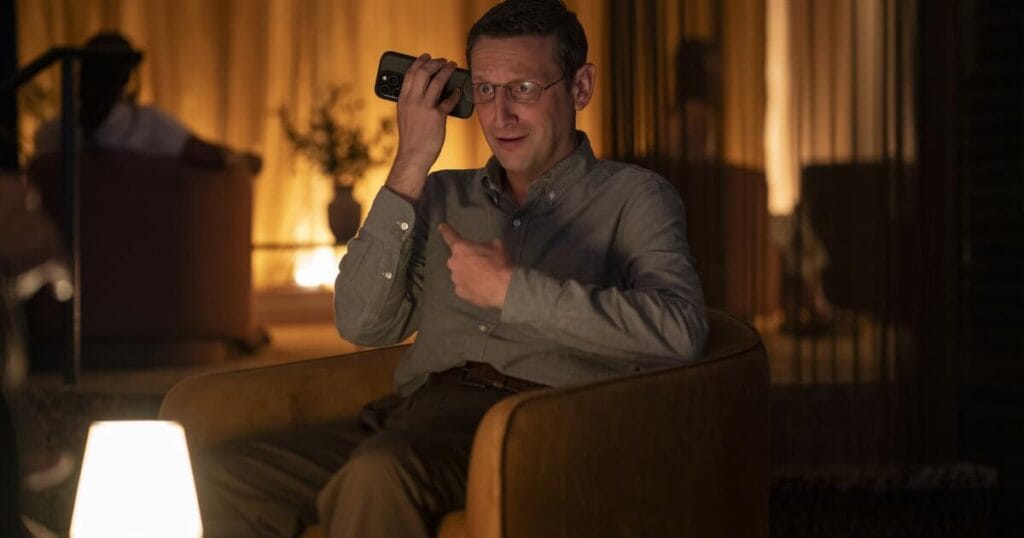“The Chair Company,” premiering Sunday on HBO, is a conspiracy comedy — dark comedy, one would definitely have to say — in which Tim Robinson goes down a rabbit hole, from one carrot to the next, after a chair collapses beneath him. It’s a thriller in its way; there will be suspense, and injuries, and a lot of screaming, mostly by the star.
Robinson, who co-created the series with Zach Kanin (who also co-created Robinson’s Netflix sketch show, “I Think You Should Leave”), is a difficult hero. His main shtick is the madman underneath a cracking veneer of civilization; physically, he projects a sort of eccentric normality, like a critique of normal. From the beginning of “The Chair Company,” we see that Robinson’s Ron Trosper is tense and nervous and can’t relax, getting into a argument with a waitress over what and what isn’t a mall — he’s been named to lead the development of a new one in Canton, Ohio. (The action all takes place in the state.)
A presentation he’d been dreading goes well, but as he sits back down, his chair — a standard office model — collapses under him, robbing him of a moment of triumph. What most would throw off with a joke sets Ron on edge, and he begins an obsessive quest to track down the manufacturer. But all he comes up with are dead ends and empty offices, and he begins to suspect a conspiracy. When, getting into his car, he’s hit on the head with a pipe and told to stop asking about the chair, it only makes him more determined to uncover it. Lurking, sneaking and stealing will ensue. Reckless behavior. Shouting.
Along with some standard office comedy involving HR reports and Ron’s “know it when I see it” boss (Lou Diamond Phillips, aging gracefully), there is a family element. Wife Barb (Lake Bell) is moving ahead with plans to develop a more attractive breast pump. Daughter Natalie (Sophia Lillis) is getting married to her girlfriend, and wants to change the venue at the last moment to a haunted house. Son Seth (Will Price), a basketball player apparently of enough talent to mention it in the series, has discovered the pleasures of drinking just as recruiters are coming around. It’s not a developed thread, but it gives Price the opportunity to deliver my favorite line in the series: “Some nights I’ll have like four beers and I’ll sit in my room and I’ll put on Abbott and Costello after I’ve had a couple; it makes me feel good to know that [these] two guys found each other because they both seem so different.” Which is a theme of the show.
The character who makes the series breathe is Mike Santini (Joseph Tudisco), the person wielding the pipe. Ron will track him down, and eventually they’ll become partners in his investigation and, after a fashion, friends. (Though Ron is not always friendly.) Mike is the series’ most original conception, and, in a strange way, its heart — someone not beyond taking money from a stranger to hit another stranger over the head, but sympathetic. Lonely, he craves the connection. Ron, for his part, is forever running out on his family to join Mike in some misadventure.
Robinson, the rare “Saturday Night Live” worker who went from performer to writer, is quite adept at playing this character, which makes Ron exhausting company; it takes a certain sort of stamina, or a love for, this particular brand of chaos to put up with him. It seems hardly credible at times that he’s successfully helped raise two rational children, one to adulthood; has attained an upper-middle-class life (with Lake Bell!); and occupies a position of creative responsibility. There are difficult comic characters you’re nevertheless happy to see — Larry David, because he’s so centered in his world and basically right, Lucille Ball because she’s a genius. But Ron spends so much time at DEFCON 1, dialed up past 11, that it can be off-putting, and drowns out the human inside.
Nevertheless, like any mystery, it draws you along, waiting for answers. Seven episodes of eight were released to reviewers; the seventh ends on what feels like a note of quiet irresolution — if not, in Ron’s mind, satisfaction. But the eighth will surely not let things rest, and you may rest assured — and may need the rest — that eight is not the end.
